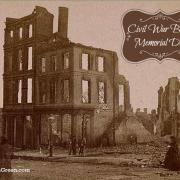Civil War Births Memorial Day
Memorial Day, as we know it, began as Decoration Day shortly after the end of the Civil War. May 30, 1868, marked the first official national observance, by proclamation of Gen. John A. Logan. But the South refused to acknowledge the observance, and it's little wonder. If you read the text of General Logan's proclamation, you'll see that the day was really meant to honor the Union dead, not the Confederates. Add to this the fact that the Federal government offered little cooperation with the attempts to bring Confederate remains home to rest in the South. Last but not least, before Arlington was a cemetery, it was Gen. Robert E. Lee's home. The Lees, and most likely thousands of other Southerners, felt that turning their home into a burial grounds for the enemy (Union soldiers) was a desecration. As a result, the South honored their dead on separate days until after World War I (when the holiday changed from honoring just those who died fighting in the Civil War to honoring Americans who died fighting in any war). It is now celebrated in almost every state on the last Monday in May, though several southern states have an additional separate day for honoring the Confederate war dead.
Click the image to see the sheet music.
In fact, Southern women were decorating the graves of their fallen heroes before the national holiday was ever designated. In 1867, a hymn by Nella L.Sweet, Kneel Where Our Loves Are Sleeping, was published with a telling dedication: "To The Ladies of the South who are Decorating the Graves of the Confederate Dead." One stanza reads: Kneel where our loves are sleeping, Dear ones loved in days gone by, here we bow in holy reverence, Our bosoms heave the heart-felt sigh. They fell like brave men, true as steel, And pour'd their blood like rain- We feel we owe them all we have, And can but kneel and weep again. Author Cilla McCain says it well in her Huffington Post article:
Although there is much dispute as to the origins of Memorial Day, it is not difficult to imagine that women are the ones who inspired the tradition. After all, for the most part, it was women who were left to bury the dead. Grief stricken and with tears flowing, they had to find a way to connect with the soldiers who paid the ultimate sacrifice for the freedoms we all enjoy. Maybe honoring them was a way to deal with not only the grief, but also the guilt we feel for surviving.
Read her complete article here. Even those of us who won't be decorating a loved one's grave this Memorial Day can appreciate the sacrifices that were made for our freedoms.

